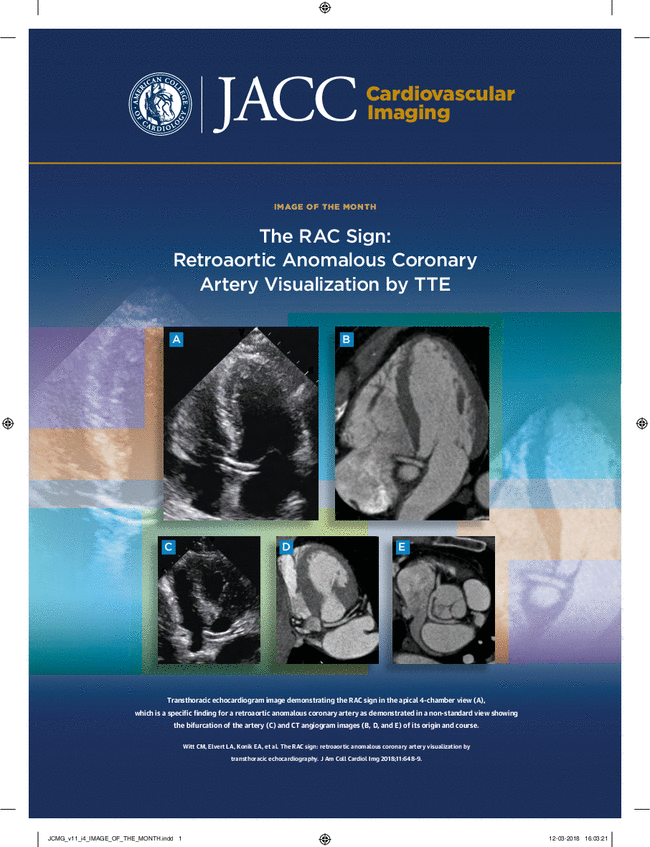冠状动脉斑块放射组学表型可预测致死性或非致死性心肌梗死:SCOT-HEART 试验分析。
IF 12.8
1区 医学
Q1 CARDIAC & CARDIOVASCULAR SYSTEMS
引用次数: 0
摘要
背景:冠状动脉计算机断层扫描(CT基于衰减的冠状动脉计算机断层扫描(CT)血管造影斑块负荷评估可以识别心肌梗死高危患者:本研究旨在评估在长期随访过程中,使用基于患者的放射学特征描述进行更详细的斑块形态评估是否能进一步提高对心肌梗死高危患者的识别能力:在 SCOT-HEART(苏格兰心血管计算机断层扫描)临床试验中对冠状动脉 CT 血管造影进行了事后分析。冠状动脉斑块分割用于计算斑块负担和描述斑块形态的特征放射学特征。使用单变量和多变量 Cox 比例危险模型评估临床和基于图像的特征与致命或非致命心肌梗死之间的关系,而使用交叉验证的 Harrell C 统计量和累积/动态曲线下面积 (AUC) 值评估预后效果:分析了 1,750 名患者(年龄为 58 ± 9 岁;56% 为男性)的扫描结果。在中位 8.6 年的随访中,82 名患者发生了致命或非致命性心肌梗死。在单变量分析中,15 个特征与心肌梗死相关,其中 8 个特征在调整心血管风险评分和斑块负担指标后仍与心肌梗死相关。在包含心血管风险评分、Agatston 评分和是否存在阻塞性冠状动脉疾病的临床模型中加入斑块负荷指标,其预测效果相似(C 统计量为 0.70 vs 0.70),而进一步加入特征放射学特征可提高模型的预测效果(C 统计量为 0.74)。在时间分析中,包含特征放射学特征的模型在随访第五年后具有更高的累积/动态AUC值:结论:基于放射组学的冠状动脉斑块形态精确表型技术可改善CT血管造影对心肌梗死的长期预测,其效果优于临床因素和斑块负荷。(苏格兰心脏计算机断层扫描[SCOT-HEART];NCT01149590)。本文章由计算机程序翻译,如有差异,请以英文原文为准。
Coronary Plaque Radiomic Phenotypes Predict Fatal or Nonfatal Myocardial Infarction
Background
Coronary computed tomography (CT) angiography–derived attenuation-based plaque burden assessments can identify patients at risk of myocardial infarction.
Objectives
This study sought to assess whether more detailed plaque morphology assessment using patient-based radiomic characterization could further enhance the identification of patients at risk of myocardial infarction during long-term follow-up.
Methods
Post hoc analysis of coronary CT angiography was performed within the SCOT-HEART (Scottish Computed Tomography of the HEART) clinical trial. Coronary plaque segmentations were used to calculate plaque burdens and eigen radiomic features that described plaque morphology. Univariable and multivariable Cox proportional hazard models were used to evaluate the association between clinical and image-based features and fatal or nonfatal myocardial infarction, whereas Harrell’s C-statistic and cumulative/dynamic area under the curve (AUC) values with cross-validation were used to evaluate prognostic performance.
Results
Scans from 1,750 patients (aged 58 ± 9 years; 56% male) were analyzed. Over a median of 8.6 years of follow-up, 82 patients had a fatal or nonfatal myocardial infarction. Among the eigen radiomic features, 15 were associated with myocardial infarction in univariable analysis, and 8 features retained their association following adjustment for cardiovascular risk score and plaque burden metrics. Adding plaque burden metrics to a clinical model incorporating cardiovascular risk score, Agatston score and presence of obstructive coronary artery disease had similar prediction performance (C-statistic 0.70 vs 0.70), whereas further addition of eigen radiomic features improved model performance (C-statistic 0.74). In temporal analysis, the model including eigen radiomic features had higher cumulative/dynamic AUC values following the fifth year of follow-up.
Conclusions
Radiomics-based precision phenotyping of coronary plaque morphology provided improvements to long-term prediction of myocardial infarction by CT angiography over and above clinical factors and plaque burden. (Scottish Computed Tomography of the HEART [SCOT-HEART]; NCT01149590)
求助全文
通过发布文献求助,成功后即可免费获取论文全文。
去求助
来源期刊

JACC. Cardiovascular imaging
CARDIAC & CARDIOVASCULAR SYSTEMS-RADIOLOGY, NUCLEAR MEDICINE & MEDICAL IMAGING
CiteScore
24.90
自引率
5.70%
发文量
330
审稿时长
4-8 weeks
期刊介绍:
JACC: Cardiovascular Imaging, part of the prestigious Journal of the American College of Cardiology (JACC) family, offers readers a comprehensive perspective on all aspects of cardiovascular imaging. This specialist journal covers original clinical research on both non-invasive and invasive imaging techniques, including echocardiography, CT, CMR, nuclear, optical imaging, and cine-angiography.
JACC. Cardiovascular imaging highlights advances in basic science and molecular imaging that are expected to significantly impact clinical practice in the next decade. This influence encompasses improvements in diagnostic performance, enhanced understanding of the pathogenetic basis of diseases, and advancements in therapy.
In addition to cutting-edge research,the content of JACC: Cardiovascular Imaging emphasizes practical aspects for the practicing cardiologist, including advocacy and practice management.The journal also features state-of-the-art reviews, ensuring a well-rounded and insightful resource for professionals in the field of cardiovascular imaging.
 求助内容:
求助内容: 应助结果提醒方式:
应助结果提醒方式:


